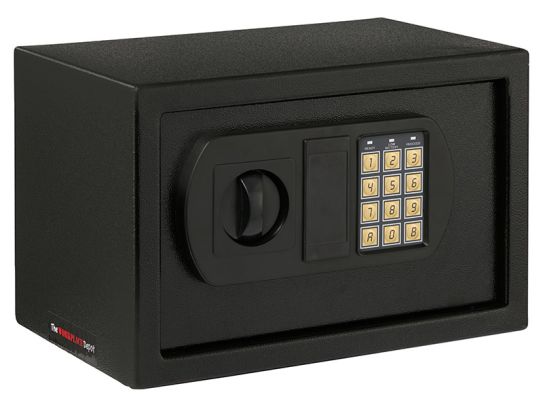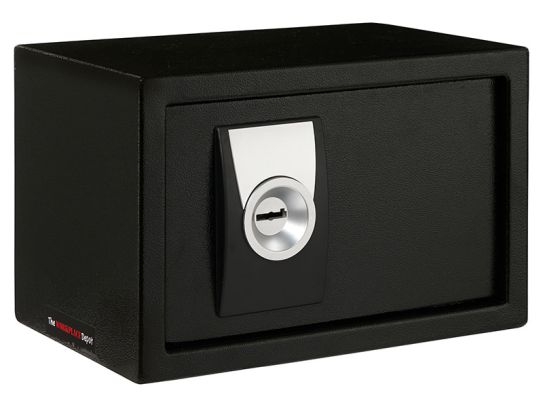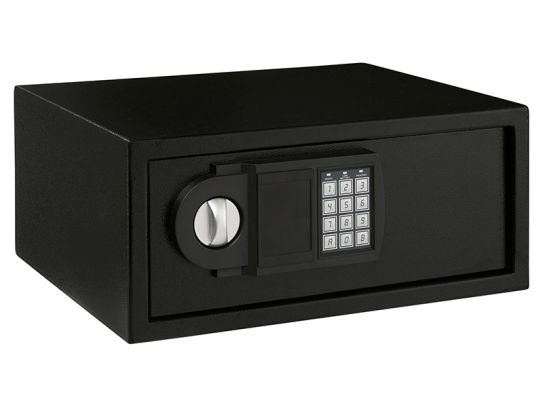Safes
Keep your valuables safe and secure with our top-of-the-line safes. Tested and certified to resist theft and fire according to European standards, our safes offer unbeatable security for your most valuable possessions. With a variety of sizes and styles to choose from, we have the perfect safe to meet your needs. Trust us to protect what matters most to you.
Trust Us to Keep Your Business Safe
Protect your valuables and sensitive information with our top-of-the-line safes. From Eurograde safes for the ultimate security to standard cabinet safes for your everyday needs, we have the perfect solution for your workplace. Keep your assets secure and peace of mind intact with our durable and dependable safes. Trust us to keep your business safe.
What Are Safes?
A safe is a secure lockable box used for storing valuable objects. Safes are typically made of steel or other durable materials and can be used to protect against theft, fire, and other types of damage. They come in a variety of sizes and styles, and can be used for both residential and commercial applications. Some safes are even designed to be fireproof or waterproof. They are used to store documents, jewellery, cash, firearms and other valuable items.
What Are Some Common Uses for Safes?
Some common uses for safes include:
- Storing valuable items such as jewellery, cash, and important documents
- Protecting firearms and ammunition
- Securing sensitive information, such as data backups or business records
- Keeping medication or other dangerous items out of reach of children
- Storing items that need to be protected from fire or flood
- Used in businesses to protect cash, valuable documents, and other important items
- Used in banks and other financial institutions to store money and other valuables.
Overall safes are used to protect items that are important to the owner and can't be replaced.
What Are the Different Types of Safes?
There are several different types of safes, each with its own unique features and characteristics. Some of the most common types of safes include:
- Fireproof safes: These safes are designed to protect their contents from fire damage. They typically have walls made of fire-resistant materials and are rated based on how long they can withstand a fire.
- Burglary safes: These safes are designed to protect against theft, with heavy-duty construction and locking mechanisms to make them difficult to break into.
- Floor safes: These safes are installed in the floor, typically in a basement or garage, and are often used for storing large items such as cash or jewellery.
- Wall safes: These safes are installed in a wall and are ideal for storing small items such as documents or jewellery.
- Depository safes: These safes are designed for businesses that need to store cash and other valuable items securely. They typically have a drop slot for depositing items and a locking mechanism to prevent theft.
- Data safes: These safes are designed to protect electronic data, such as hard drives or USB drives, from damage caused by fire, water, or other hazards.
- Gun safes: These safes are designed specifically to store firearms and ammunition, and often have locking mechanisms that comply with local laws and regulations.
- Eurograde safes: They are a class of safes that have been tested and certified to resist theft and fire according to European standards, known as EN standards. They are rated from one to seven with one being the lowest and seven the highest level of protection.
- Cabinet safes: These safes can be used for both residential and commercial applications, They are designed for storing documents, jewellery, cash, and other valuable items.
What Are the Key Features to Consider When Choosing Safes?
When choosing a safe, there are several key features to consider, including:
- Size and capacity: Consider the size of the safe and the amount of items you need to store. This will ensure that you choose a safe that has enough space for your needs.
- Level of security: Consider the level of security you need. Some safes have higher levels of protection against fire, theft, or other hazards. It's important to consider the purpose of the safe, and what you will be storing in it, to determine the appropriate level of security.
- Fire resistance: If you need to protect items from fire, it is important to choose a safe that is fireproof or fire-resistant. Look for safes that have been tested and certified to withstand high temperatures for a certain period of time.
- Locking mechanism: Consider the type of locking mechanism you prefer. Some safes have a combination lock, while others have a key lock or digital lock.
- Portability: If you need a safe that is portable, consider a smaller safe that can be easily moved.
- Installation: Some safes require professional installation, while others can be installed by the user. Be sure to consider the installation requirements when choosing a safe.
- Cost: The cost of the safe will vary depending on the features, level of security and brand. It's important to compare safes from different brands and to choose one that fits your budget while also meeting your security needs.
- Brand and warranty: Look for a safe from a reputable brand that comes with a warranty. This will give you peace of mind in knowing that if anything goes wrong, you will be able to get it fixed or replaced.
Overall, it's important to consider your specific needs and the items you will be storing in the safe when choosing the right safe for you.
Can a Safe Be Broken Into, and If So, How Can I Prevent It?
It is possible for a safe to be broken into, although the level of difficulty and success will depend on the quality and security features of the safe. However, there are several ways to prevent a safe from being broken into:
- Choose a safe with a high level of security: Look for a safe that has been tested and certified to resist theft and fire according to European standards, known as EN standards.
- Use a locking mechanism that is difficult to pick or bypass: Consider a safe with a digital lock or biometric lock, which is more difficult to pick than a traditional key lock.
- Anchor the safe to the floor or wall: This will make it more difficult for a thief to remove the safe from the location.
- Camouflage the safe: Making the safe blend in with the surrounding environment can make it more difficult for a thief to find and target.
- Keep the safe in a secure location: Store the safe in a location that is not easily accessible to potential thieves, such as a basement or a locked room.
- Consider a monitored alarm system that will notify you or authorities if an intrusion is detected.
It's important to note that while safes can be difficult to break into, a determined thief with the right tools and knowledge can still succeed. The best way to protect your valuables is to have a comprehensive security plan in place and stay vigilant.
What Safety Considerations Should Be Taken Into Account When Using Safes?
When using a safe, it's important to take several safety considerations into account to ensure that your valuables remain secure and that you don't put yourself at risk:
- Proper installation: Make sure that the safe is properly installed according to the manufacturer's instructions. Improper installation can compromise the security of the safe and put you at risk of injury.
- Use a secure locking mechanism: Use a locking mechanism that is difficult to pick or bypass, such as a digital lock or biometric lock, to keep your valuables secure.
- Know how to open the safe: Make sure that you know how to open the safe and that you have a backup method of opening it in case you forget the combination or the batteries die.
- Secure the safe in a safe location: Make sure that the safe is in a location that is not easily accessible to potential thieves, such as a basement or a locked room.
- Consider fire protection: If you are storing items that are sensitive to heat or fire, consider a fireproof safe that can protect your items from fire damage.
- Keep the safe clean and well-maintained: Regularly clean and maintain the safe to ensure that it continues to function properly.
- Keep the safe key or combination in a secure place: Keep the key or combination to the safe in a secure place, such as a locked cabinet or safe deposit box.
- Do not leave the safe open: When you're not using the safe, make sure to close and lock it to prevent unauthorised access.
- Keep the safe out of reach of children: Some safes can store items that can be dangerous to children, make sure to keep the safe out of reach of children.
- Keep the safe away from potential flood or water damage: If the safe is stored in an area that is prone to flood or water damage, make sure that it is placed in a location that is safe from such hazards.
By following these safety considerations, you can ensure that your valuables remain secure and that you don't put yourself at risk when using your safe.
Are There Any UK or European Industry Standards or Regulations That Apply to Safes?
Yes, there are UK and European industry standards and regulations that apply to safes.
- In the UK, safes are tested and certified by the Association of Insurance Surveyors (AiS) and the Loss Prevention Certification Board (LPCB). They are tested for fire resistance and attack resistance according to the standard BS EN 1143-1.
- In Europe, safes are tested and certified according to the European standard EN 1143-1. The standard is divided into seven grades, from 0 to VI, with grade VI being the highest level of security. The standard tests the safes for both fire resistance and attack resistance.
- In addition to these standards, there are also regulations that apply to specific types of safes. For example, gun safes must comply with local laws and regulations regarding the storage of firearms.
It's important to note that not all safes are tested and certified to these standards, and not all safes that are tested and certified meet the same level of security. It's important to look for safes that have been tested and certified to these standards, and to choose a safe that meets the appropriate level of security for your needs.


